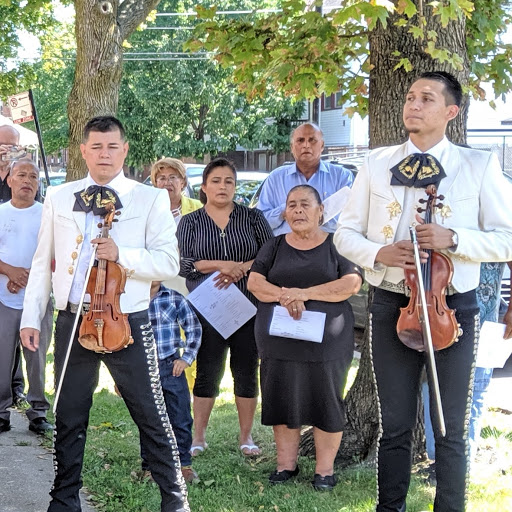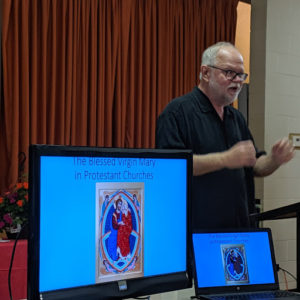How to Tactfully Navigate Conversations about Your Christian Faith

Therefore go and make disciples of all nations, baptizing them in the name of the Father and of the Son and of the Holy Spirit, and teaching them to obey everything I have commanded you. And surely I am with you always, to the very end of the age.
Matthew 28:19-20
Have I not commanded you? Be strong and courageous. Do not be afraid; do not be discouraged, for the LORD your God will be with you wherever you go.
Joshua 1:9
Jesus Told Us to Go
Go, and do not be afraid. At once these instructions are both so easy, and yet for many Christians they are also so difficult. Despite God’s clear command to teach others about our faith and His reassurance that He will be with us, American culture is in the midst of a staggering trend against evangelism. In 1993, a Barna Group study showed that 89% of Christians believed it was the responsibility of every Christian to share their faith. By 2018 that number had dropped 25 points to only 64%. 65% of Christians said they share their faith by the way they live instead of (not in addition to) talking to people about Christ.
Why the Hesitation?
Why are people so hesitant to open their mouths and declare the name of Jesus? Yes, we should be living out our faith with our actions, but Jesus specifically said to “teach” people. That requires us to talk to them. Yet so many Christians are afraid to do so.
Have you ever heard any of these statements?
Conversations about religion always become so heated.
What if I don’t know how to answer their questions?
How do I even get the conversation started?
These are all common refrains that hold people back from talking about their faith. The reason they hesitate isn’t because they don’t know they should be evangelizing. It’s because they’re afraid they don’t know how.
Two Main Fears
In my experience people’s hesitancy is largely driven by two main fears. First, “How do I get the conversation started without sounding awkward?” Second, “What if I don’t know how to answer the other person’s questions?” What follows is a brief introduction to how we can overcome these fears while at the same time showing courtesy and respect so as to keep the conversation cordial.
Talk with People
First, how do we begin the conversation? For starters, we need to talk with people and not at them. We may have a whole list of important information about the gospel and we just have to get it out. We launch into a rapid-fire monologue, taking short breaths in between sentences, so the other person doesn’t have time to interrupt our incredibly important litany. After all, if they get a word in edgewise we might get sidetracked from our list.
Shields Up!
When we talk at someone, our primary concern is to convey all the information we think they need to hear. But when we talk with them we are more worried about listening to what they have to say and engaging in a two-way dialogue. The moment someone senses you are talking at them their defenses will go up and any opportunity for a meaningful conversation will be over. They’re not listening to you. While you’re rambling on, their mind is planning out their counterattack.
Talking at someone places the focus on us. Talking with someone places the focus on them. The people we are speaking to are individuals, not targets. Showing respect to someone means being invested in who they are, not just in what you want to tell them.
For many people I’ve probably just ratcheted up the anxiety level even higher. After all, it’s a lot harder to talk with someone than it is to talk at them. If I’m talking at a person, I’m in complete control. I don’t have to worry about anything they might say because … I’m never giving them a chance to say anything. But engaging in a dialogue is scarier. All of a sudden I have to worry about what someone else is going to say to me, and that’s what I don’t know if I can handle.
But dialogue doesn’t need to be scary. In fact, it’s a lot easier than many people think. There are three easy steps that can serve as a broad outline to any faith conversation, and with just a little bit of practice all of us can all become more comfortable declaring Christ both with our actions and our words.
First Pray
The first step should be the most obvious but is one I think too many people today skip over. Pray. God has told us not to be discouraged because He will be with us. Do we believe Him? Walking with us in our times of need is an incredibly small thing compared to dying on the cross. If God did the latter, shouldn’t we be able to trust Him to do the former? Yet we live in a culture that tells us to pick ourselves up by our own bootstraps and praises individual accomplishment. So ironically even in much of our ministry, many Christians try to “do it on their own” without first stopping and asking the Holy Spirit to be a part of what they are undertaking. Just like we should pray before every ministry meeting, we should pray when we set out to evangelize.
Then Look for Opportunities
Second, we need to look for opportunities. They’re all around us. Most of the time we’re just not paying attention. Michael Ramsden, President of Ravi Zacharias International Ministries, tells a story about a time he was in a hair salon and overheard the owner say to a stylist next to her, “My business is doing so well but there must be more to life than this.”[1] That was an opportunity, and he took it. There is more to life than succeeding in business, no matter what our culture says. By paying attention to what was going on around him, Mr. Ramsden was able to start up a conversation that led to an hour and fifteen-minute discussion of the gospel.
Keep Doors Open
Not every opening will be that obvious. Recognizing when these chances arise will often require us to have at least a basic understanding of the topics that are permeating our culture. Maybe it’s a meme circulating on social media. Maybe it’s the acceptance speech some Hollywood celebrity just gave at an awards show. Maybe it’s the latest blockbuster in the movie theater. People are always talking about something, and those “somethings” very often will open the door to a discussion on faith. The question is simply whether we are going to walk through it. We don’t need to immerse ourselves in every aspect of contemporary Western culture. But at the same time, we can’t be completely oblivious to it either. Paul knew what the Greeks valued when he spoke at the Areopagus. We need to be aware of what unknown god our culture is worshipping.
Ask Questions
So, we’ve prayed, we’ve seen an opportunity arise, and now we’re wondering how to seize it. What do we say to get the conversation started? That leads into step 3, ask, don’t tell. This one seems a bit counter-intuitive to some people. If we have all this information we want the other person to hear, shouldn’t we be the one doing the talking and they be the one doing the listening? Actually, you can accomplish even more by primarily using questions, plus you gain some other important advantages.
Questions invite the other person to speak. They can’t shut down because you are talking at them if they are doing most of the talking. But even though they are doing most of the talking, you are actually in control of the conversation. Questions determine which topics are up for discussion, and you are the person asking all the questions. Finally, questions foster conversation. When one person is asking a question and another is giving an answer, there are two people invested in the discussion. Our goal is not to lecture, but to listen and have a dialogue.
Greg Koukl has a fantastic book called Tactics: A Game Plan for Discussing Your Christian Convictions. Anyone who wants to learn more about how to effectively evangelize should have a copy, read it, and keep it handy. Koukl calls his primary tactic the “Columbo Tactic,” named after the famous television detective played by Peter Falk. Columbo was famous for asking question after question while investigating a case, and our approach to evangelism can look very similar.
Three Ways to Direct a Conversation
Koukl explains three ways we can use questions to direct a conversation. The first is to use them to gather more information. An example is, “What do you mean by that?”[2] When a person makes a statement, the first thing we should do is ask a question. Something of the variety of “What do you mean by that?” not only allows us to make sure we are understanding them correctly, but sometimes it gets the other person to think through what they’re saying. In today’s social media age, many people are merely repeating slogans they’ve heard that sounded good, but they have no idea what they actually mean.
The second way to use questions is to reverse the burden of proof. Koukl’s example for this is, “How did you come to that conclusion?”[3] There is a trap that almost all of us have fallen into from time to time. Someone makes a statement that we know is false. Our immediate instinct is to explain to them why it is false. So, we launch into our long explanation, rattling off all our evidence, convinced that in the end the other person will come around and see things our way. If we do that, we end up talking at people again and their defensive walls will spring right up.
There’s a better way to handle this situation. When someone makes a statement that runs contrary to what God has told us to be true, just ask them a question. Start out by making sure you are understanding them correctly with “What do you mean by that?” But then follow it up with “How did you come to that conclusion?” It may surprise you to hear that the vast majority of conversations I engage in with people when they make claims like this never need to get past this second question. Most people have no idea how they arrived at any particular conclusion. Their claim wasn’t borne out of some rational evaluation of the arguments and evidence resulting in a well thought out conclusion. They read some meme online that they agreed with, so now they’re just repeating it. If someone else makes a claim, it is not your job to refute it. It is their job to defend it. Asking them politely “How did you come to that conclusion” is one way to respectfully place the burden on them, where it belongs.
The third way Koukl suggests we can use questions is to make a point.[4] This is where you finally have the opportunity to inject all that information you have inside your head into the conversation. But you still need to resist the temptation to talk at people. The most inviting way to insert information into the discussion is to use a question. “Have you ever considered…?” “What do you think about…?”
Ask, Don’t Tell
There’s a fundamental difference between merely telling people information and asking them questions about it. When you tell, you may come across as if you believe you are smarter or superior. But when you ask, you are showing genuine interest in them and their opinions. At the same time, you are inviting them to think through something they may not have thought about before. They are much more likely to do so if they don’t feel like they are being “preached at.”
Suppose you know absolutely nothing about embryology, but you hear someone say, “Christians have no right to object to abortion unless they’re willing to take care of all the extra babies that will be born if abortion is outlawed.” You can still ask them a “what do you mean by that” type of question. For example, “I just want to make sure I’m understanding you correctly. You’re saying that no one has the right to object to unborn children being killed unless they’re willing to take care of those unborn children, is that right?” You could follow it up with a question of the “how did you come to that conclusion” variety. “How is it that my not having the resources to personally take care of a child makes it okay to kill it?”
Too often people hesitate to evangelize because they don’t think they know enough. They want to leave that sort of thing to the “professionals,” like their pastor. But each and every one of us is expected to share our faith, not just those in church leadership. Anyone can ask questions, so all of us know enough to get out there and get started.
Admit You Don’t Know
But what if someone says something that you don’t know how to answer? That is one of the biggest causes of anxiety, and yet at the same time it is one of the easiest questions to answer. If someone asks you something you don’t know how to answer, you politely say, “I don’t know the answer to that. Let me look into it and I’ll get back to you.” Then you politely end the conversation.
Conversion Is the Holy Spirit’s Job
We often put way too much pressure on ourselves. We think that each and every conversation needs to result in the other person accepting Christ or else it was useless. Nothing could be further from the truth. We have to remember that conversion isn’t our job. We can’t convert anybody anyway. That’s the Holy Spirit’s doing. Our job is to do as we have been instructed, so that if the Spirit wants to use us as an instrument through which He works, then we are obediently available.
To Sum It Up
Greg Koukl describes a more modest goal he sets for himself when engaging in evangelistic conversations. “All I want to do is put a stone in someone’s shoe. I want to give him something worth thinking about, something he can’t ignore because it continues to poke at him in a good way.”[5] We worry so much about what other people will say because we think we need to have all the answers. We don’t. Just set yourself a modest goal and get out there and share the gospel. First, pray. Second, look for opportunities. Third, ask, don’t tell. Use questions to gather information, to reverse the burden of proof and to make a point. We all know that we should be sharing God’s good news. Hopefully this basic outline can help reassure you as to how.
[1] Centre for Public Christianity, “Conversation Apologetics – Michael Ramsden,” March 24, 2018, video, 44:32, https://www.youtube.com/watch?v=9MJb5_2CABI.
[2] Greg Koukl, Tactics: A Game Plan for Discussing Your Christian Convictions (Grand Rapids, MI: Zondervan,2009), 49-52.
[3] Ibid., 61-64.
[4] Ibid., 77-87.
[5] Ibid., 38.








 newal, for both church and society, for several reasons. First, it renews the church because it puts the church back where it belongs: in front of the empty tomb, facing the wide-open future that shines in the face of Christ. Like the empty tomb, forgiveness doesn’t erase the past. To the contrary, it carries the past forward — He’s still the man who died on the cross, wounds and all — but in such a way that this person with such a past may yet live, love, be worthy, and even rule. What excitement! What release!
newal, for both church and society, for several reasons. First, it renews the church because it puts the church back where it belongs: in front of the empty tomb, facing the wide-open future that shines in the face of Christ. Like the empty tomb, forgiveness doesn’t erase the past. To the contrary, it carries the past forward — He’s still the man who died on the cross, wounds and all — but in such a way that this person with such a past may yet live, love, be worthy, and even rule. What excitement! What release!  Yet this absolution, coming from God, may renew things well beyond the church, because God’s goodness always seems to spill over its borders. The absolution carries in itself more than a new future and a happy Lord. It carries also the stamp of that Lord’s virtue and wholesome way. To trust forgiveness is to trust patience and compassion—who can forgive a sinner without taking the time to sympathize with him? And for Christians to trust and preach forgiveness is to trust and preach Christ crucified, the very picture of God “counting others better” than Himself (Philippians 2:3). When that image and rumor of mercy start permeating Christians, and Christians start seeping into society and infecting it, they take that virtue and ethic with them.
Yet this absolution, coming from God, may renew things well beyond the church, because God’s goodness always seems to spill over its borders. The absolution carries in itself more than a new future and a happy Lord. It carries also the stamp of that Lord’s virtue and wholesome way. To trust forgiveness is to trust patience and compassion—who can forgive a sinner without taking the time to sympathize with him? And for Christians to trust and preach forgiveness is to trust and preach Christ crucified, the very picture of God “counting others better” than Himself (Philippians 2:3). When that image and rumor of mercy start permeating Christians, and Christians start seeping into society and infecting it, they take that virtue and ethic with them.







 need to “go out and be separate.” If we hope to not see our frogs boiled in the way other communions have unfortunately experienced, we will need to be intentionally countercultural. Our catechesis and our sermons will need to be apologetic in tone, whether we are apologists by vocation or not. We will need to listen carefully to a world that hates us so we may build bridges to their linguistics worlds of meaning and so that we can dismantle Trojan Horses meant to destroy Christianity and its necessarily attendant, coherent worldview from within.
need to “go out and be separate.” If we hope to not see our frogs boiled in the way other communions have unfortunately experienced, we will need to be intentionally countercultural. Our catechesis and our sermons will need to be apologetic in tone, whether we are apologists by vocation or not. We will need to listen carefully to a world that hates us so we may build bridges to their linguistics worlds of meaning and so that we can dismantle Trojan Horses meant to destroy Christianity and its necessarily attendant, coherent worldview from within.